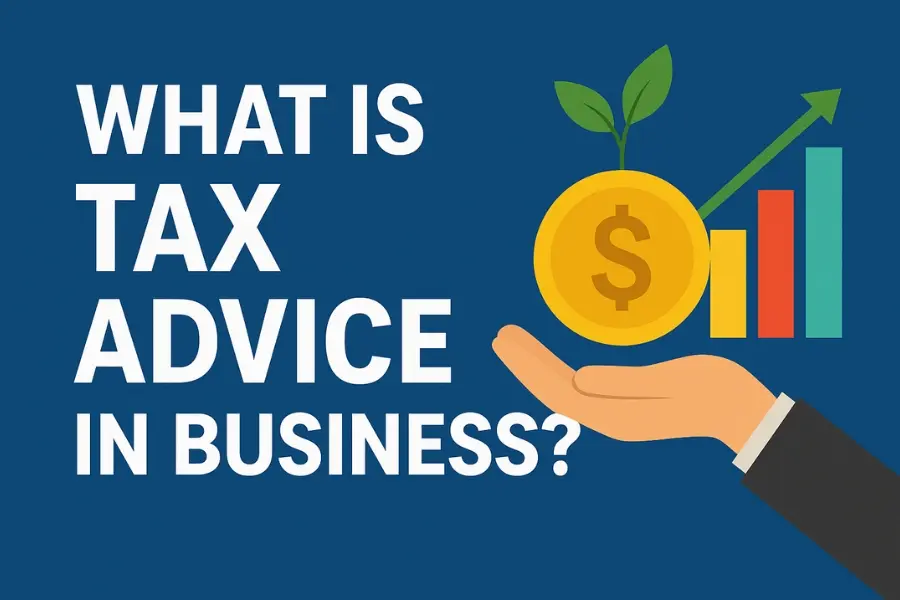What is Tax Advice in Business? A Tax Strategies Guide
Updated: 28 Jan 2026
Tax advice in business plays a crucial role in helping business owners manage their finances wisely. Whether you’re running a small startup or leading a large corporation, having the right tax strategies in place can make a huge difference. Effective tax planning not only helps you save money but also keeps your business compliant with ever-changing tax laws.
Understanding what tax advice in business means is the first step toward smarter financial management. It involves professional guidance on how to structure your business, plan for tax payments, and take advantage of legal deductions and credits. With proper tax advice, you can make informed decisions that enhance your company’s overall profitability.

By following expert tax tips and strategies, business owners can significantly reduce their tax liabilities, avoid costly mistakes, and maintain financially healthy operations. Whether it’s through year-round tax planning or seeking professional support, effective tax management is key to ensuring long-term business success.
What is Tax Advice in Business?
Tax advice in business refers to professional guidance that helps business owners understand and manage their tax obligations. This type of advice includes recommendations on tax planning, deductions, credits, and strategies tailored to your business structure. Tax advice can be crucial for entrepreneurs seeking to minimize their tax liabilities and comply with local, state, and federal tax laws.
Tax advice for small business owners and independent contractors typically focuses on optimizing taxes, reducing expenses, and providing insights into the best ways to handle business taxes, whether it’s through business tax services or consultations.
What is a Tax Write-Off and Tax Deduction for Small Businesses? Video
Why is Tax Advice Important for Business Owners?
Tax advice in business helps business owners in several ways:

1. Tax Planning and Strategy
- Effective business tax planning strategies are essential for maximizing a business’s profits while minimizing its tax obligations. Whether you’re an LLC owner or operating a corporation, tax planning should be part of your long-term business strategy.
2. Ensuring Compliance
- With constantly changing tax laws, it’s easy for business owners to overlook important changes or deadlines. Professional business tax services ensure that all tax filings are accurate and on time.
3. Identifying Tax Deductions
- Tax advice can help you identify tax loopholes for small businesses, as well as common deductions that many businesses overlook, such as small business tax strategies for LLCs or write-offs for small businesses.
4. Maximizing Profitability
A business tax consultation can provide valuable insights into structuring your business in a way that maximizes deductions and minimizes your tax burden, ultimately improving cash flow and profitability.
Key Areas Covered in Tax Advice for Businesses
1. Business Tax Planning Strategies
- Tax planning is a crucial part of running a successful business. Business tax planning strategies may include establishing the appropriate business structure (e.g., LLC, Corporation), planning for future growth, and making informed decisions about investments and expenditures.
2. Tax Deductions and Credits
- There are several tax tips for small business owners to reduce taxable income, including deductions for business expenses, employee salaries, and equipment. For small businesses, knowing what you can write off on taxes can significantly reduce liabilities.
3. Sales and Payroll Taxes
- Understanding how sales tax and payroll taxes affect your business can save you from penalties. A consultation on small business taxes for beginners can clarify these aspects.
4. Tax Advice for LLC Owners
- One of the most common tax questions is, “How do LLC owners avoid taxes?” While avoiding taxes entirely is impossible, an LLC structure can help reduce tax rates compared to other structures. Tax advice for LLC owners often focuses on ensuring the LLC is taxed as a partnership or S corporation, which can help reduce self-employment taxes.
5. International Tax Considerations
- For businesses with international operations, tax advice may include guidance on tax tips for individuals with cross-border investments or income.
How to Choose the Right Tax Advisor for Your Business
Choosing the right tax advisor is crucial for ensuring that your business is on track to save money and remain compliant. Here’s how to make the best decision:
1. Specialization in Business Taxes
Seek tax advice from small business owners or advisors with experience in your specific industry. Whether you’re seeking tax advice for independent contractors or business tax advice for a growing enterprise, specialization ensures you receive relevant and effective guidance.
2. Online Appointments and Accessibility
- If you prefer flexibility, look for a piece of tax advice in business open now or find those offering online appointments for tax advice in business. Many top-rated tax advisors provide virtual consultations, making it easier to get the advice you need.
3. Qualifications and Experience
- Ensure your tax advisor has the proper qualifications, such as a Certified Public Accountant (CPA) or a tax attorney, and has substantial experience with small business tax strategies.
9 Best Practices for Small Business Taxes
1. Keep Accurate Records
- Accurate financial records are the foundation of good tax planning. Regularly track all business expenses and income.
2. Take Advantage of Tax Deductions
- Understand which expenses are deductible and keep all receipts for items such as business travel, office supplies, and utilities.
3. Stay Up-to-Date on Tax Laws
- Tax laws change regularly. Stay informed about updates and ensure you’re compliant with the latest regulations.
4. Use Accounting Software
- Invest in accounting software to streamline your tax preparation process and avoid errors.
5. Consult a Tax Advisor Early
- Don’t wait until tax season to consult a tax professional. Obtaining tax advice for your business early can save you money and stress in the long run.
6. Plan for Self-Employment Taxes
- If you’re self-employed, plan for self-employment taxes well in advance. They can be significant, but proper planning can minimize the impact.
7. Review Your Business Structure
- Consider whether your current business structure is the most tax-efficient. Transitioning to an LLC or an S-Corp might offer tax advantages.
8. Maximize Retirement Contributions
- Contributions to retirement accounts can reduce your taxable income. Explore tax-deferred retirement plans, such as SEP IRAs or 401(k)s.
9. Use Tax Credits
- There are numerous tax credits available for small businesses, including credits for hiring employees, investing in renewable energy sources, and offering healthcare benefits.
8 Tax Tips for Small Business Owners
1. Separate Business and Personal Finances
- Keep your personal and business finances separate to avoid mixing personal and business deductions.
2. Utilize an Accountant or Tax Advisor
- Seek professional tax advice for small business owners to ensure you’re taking full advantage of available tax strategies.
3. Track All Expenses
- Track every expense to ensure that you can write it off. This can include office supplies, software subscriptions, and even meals if they relate to business.
4. Monitor Sales Tax Collection
- Ensure you are collecting the correct amount of sales tax from your customers to avoid penalties.
5. Consider the Tax Implications of Expanding
- Before making significant investments or expanding your business, consult your tax advisor to understand how these actions might affect your tax situation.
6. Leverage Depreciation
- Depreciation is a great way to reduce your taxable income if you’ve purchased expensive business equipment.
7. Be Aware of Estimated Taxes
- If you’re self-employed or a business owner, make sure you’re paying estimated quarterly taxes to avoid penalties.
8. Plan for the Future
- Integrate long-term tax planning into your business strategy to mitigate unexpected tax burdens.
What are the Biggest Tax Mistakes Business Owners Make?
The biggest tax mistakes business owners make often include:
Not Keeping Track of Receipts
- Not tracking all business expenses means missing potential deductions.
Failing to Pay Estimated Taxes
- Failing to pay quarterly taxes can result in fines and penalties.
Misunderstanding Deductions
- Misinterpreting what is deductible can result in costly mistakes.
Ignoring Tax Deadlines
- Missing deadlines for tax filings can trigger penalties and interest charges.
Advantages & Disadvantages
Some Advantages & Disadvantages of Tax Advice in Business are written here:
Advantages of Tax Advice in Business
- Optimized Tax Savings
- Helps identify deductions, credits, and loopholes to minimize tax liabilities.
- Improved Financial Planning
- Assists in long-term planning for better cash flow and resource allocation.
- Compliance with Tax Laws
- Ensures accurate filings and adherence to changing regulations, avoiding penalties.
- Tailored Strategies for Business Structures
- Provides customized solutions based on the type of business (LLC, Corporation, etc.).
- Time-Saving
- Frees up time for business owners by handling complex tax matters.
- Access to Expert Knowledge
- Advisors bring expertise in niche areas, such as payroll taxes and international operations.
- Reduction in Tax Errors
- Minimizes filing mistakes and decreases audit risks.
Disadvantages of Tax Advice in Business
- Cost of Services
- Fees for tax advisors can be expensive, especially for small businesses.
- Risk of Dependency
- Over-reliance on advisors may prevent business owners from understanding their finances.
- Potential for Miscommunication
- Incomplete information from the business can lead to inaccurate advice.
- Quality Varies Among Advisors
- Not all advisors are equally skilled; hiring an inexperienced one can lead to issues.
- Fraud Risks
- Some advisors may suggest unethical methods, which can lead to potential penalties.
- Changing Tax Regulations
- Frequent changes in laws may impact the relevance of the advice given.
- Limited Availability
- Access to qualified advisors may be challenging during busy tax seasons.
FAQs
Questions and Answers section related to Tax Advice in Business
Tax advice in business refers to professional guidance provided to business owners to manage their tax obligations efficiently. It includes planning strategies, identifying deductions, ensuring compliance, and optimizing tax savings based on the business structure.
Tax advice is crucial for small business owners because it helps:
- Minimize tax liabilities.
- Identify tax-saving opportunities, such as deductions and credits.
- Avoid penalties by ensuring compliance with tax laws.
- Develop long-term tax strategies for financial stability.
LLC owners benefit from tax advice as it helps them:
- Choose the most tax-efficient classification (e.g., S-corp taxation).
- Reduce self-employment taxes.
- Understand allowable deductions for expenses and profits.
- Navigate multi-member LLC tax implications effectively.
Some common tax mistakes include:
- Failing to keep accurate financial records.
- Missing deadlines for quarterly tax payments.
- Misclassifying employees as independent contractors.
- Overlooking deductions or claiming ineligible ones.
Yes, consulting a tax advisor can save money by:
- Reducing tax liabilities through strategic planning.
- Identifying overlooked deductions and credits.
- Avoiding penalties due to errors or late filings.
When choosing a tax advisor, consider:
- Their qualifications include certification as a CPA or tax attorney.
- Experience with businesses similar to yours.
- Specialization in small business or industry-specific taxes.
- Availability for consultations during peak tax seasons.
Yes, many tax advisors offer online services, including virtual consultations and resources for small business tax strategies. This allows business owners to access professional guidance from anywhere.
Effective tax-saving strategies include:
- Leveraging retirement contributions to reduce taxable income.
- Taking advantage of business-related deductions like travel and utilities.
- Using depreciation for expensive equipment.
- Structuring the business for optimal tax benefits, such as forming an LLC or an S-Corp.
Tax advice can assist independent contractors by:
- Identifying eligible deductions, such as home office expenses and equipment costs.
- Managing self-employment taxes efficiently.
- Ensuring compliance with estimated quarterly tax payments.
While beneficial, tax advice has potential downsides, such as:
- High costs for professional services.
- Risk of dependency on advisors for financial decisions.
- Variability in the quality of advisors’ expertise.
To avoid penalties and audits:
- File taxes accurately and on time.
- Keep detailed and organized financial records.
- Consult a tax advisor for complex tax matters.
- Adhere to ethical practices and steer clear of questionable tax strategies.
Best practices include:
- Keeping personal and business finances separate.
- Staying informed about tax law changes.
- Using accounting software to streamline processes.
- Regularly consult with a tax advisor for updates and planning.
You May Also Like
If you found this article on Tax Advice in Business helpful, here are more insightful reads to expand your business knowledge:
1. Financial Planning for Businesses
Learn how to manage your company’s finances effectively. This guide covers budgeting, forecasting, and smart financial decisions that help your business stay profitable and sustainable.
Discover the five essential investment strategies that can help you grow your wealth and secure your financial future with confidence.
Explore global funding opportunities and find the right financial support to launch, expand, or sustain your business successfully.
4. Thought Leadership in Business
Unlock the secrets to becoming a thought leader in your industry. Learn how to inspire, influence, and innovate within your business space.
Conclusion
Tax advice in business is not just about avoiding taxes but about strategic planning that helps ensure long-term success. Whether you’re a small business owner or an independent contractor, seeking professional business tax advice can ensure that you’re taking full advantage of tax-saving opportunities and complying with the latest tax regulations. If you’re unsure where to start, schedule a business tax consultation today and begin implementing effective tax strategies for your business.
Call to Action
Looking for expert tax advice for small business owners? Contact our team of certified professionals for personalized tax planning services. Schedule an online appointment for tax advice in business today!
- For bold: [b]text[/b]
- For italic: [i]text[/i]
- For underline: [u]text[/u]






